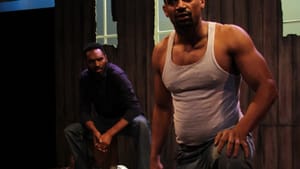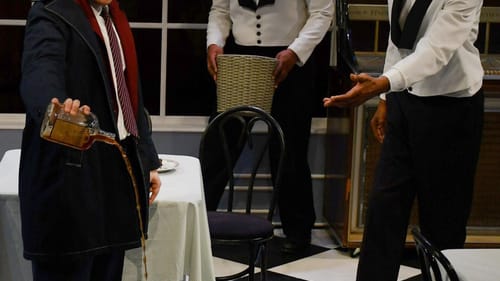Stay in the Loop
BSR publishes on a weekly schedule, with an email newsletter every Wednesday and Thursday morning. There’s no paywall, and subscribing is always free.
How far we’ve come—or not
EgoPo and Theatre in the X present Censored: A Rotating Repertory of Two Banned South African Plays

EgoPo Classic Theater concludes its season-long exploration of South African theater with Censored, a repertory production of two plays banned by the government under apartheid. Both works are staged in the same performance space at the Latvian Society Theater, but depending on which you’re seeing, you will be asked to enter through different doors. Given that both works consider the fraught legacy of brutal, forced subjugation from strikingly divergent perspectives, this feels apt.
Two entries
For Athol Fugard’s “Master Harold”… and the Boys, you enter into the posh world of segregated country clubs down a garden path of verdant, blossoming flowers and gleaming white trellises. Egoli: City of Gold, by Matsemela Manaka, sends you down a rickety mineshaft into dirt-strewn darkness. Dirk Durossette transforms the same rectangular platform from an upper-class enclave into a dark, dusty lean-to, strewn with unwashed clothing and spent liquor bottles. In doing so, the audience sees the reality of apartheid from two vastly variable perspectives.
That discrepancy reflects the careers of Fugard (born in 1932 and still an active writer, director, and actor) and Manaka (1955-1998). When Fugard wrote “Master Harold," he was already a well-established international theater artist, seen as a leading voice against prejudice and racism in his home country. His status as a white man decrying apartheid afforded him rights and protections unavailable to black writers like Manaka, who were barred from producing or publishing their work at the time.
Meet Manaka
Though considered a foundational figure of the black theater movement in his home country, Manaka remains largely unknown outside of South Africa, even 20 years after his death. That lack of recognition will seem shameful upon viewing Katrina Shobe’s breathtaking production of Egoli, which EgoPo mounted in collaboration with Theatre on the X. In the same vein as Fugard, Manaka took cues from the likes of Beckett and Brecht in crafting an openly didactic, message-driven play, and with good reason. His characters scream for the freedom they have been denied.
Hamilton (Walter DeShields) and John (Carlo Campbell), miners and escaped convicts, exist under the weight of their society’s suppressive attitude toward people of color. The horror of segregation seeps in slowly as they recount the indignities they’ve faced while listening to records, drinking beer, and arguing over the proper way to seduce women. Sometimes it’s a subtle lack of respect. Sometimes it’s violent, as when John recalls being beaten savagely for insulting a white man. Their literal liberation, forged under cover of night, still comes with chains.
DeShields and Campbell, cofounders of Theatre on the X, display an easy rapport that proves ideal for the quick-draw shifts between levity and deep sorrow in the play. They show that happiness is fleeting when you’re not free. As the drama moves toward a shattering conclusion, Campbell proves especially harrowing, an unexpected tragedy severing the final thread of his spirit.
EgoPo’s festival-style season planning has often introduced Philadelphia audiences to little-known writers whose importance to theater history may have been neglected. Manaka joins those ranks, and this fine production of Egoli does him great justice.

Impossible friendship
Paired with such an urgent, affecting work, “Master Harold” seems hollow in comparison. Fugard’s exploration of the relationship between the title character, a teenaged son of privilege, and his family’s two black servants considers the unequal balance of power between white and black citizens, when the skin color of a child mattered more than the wisdom of age. Yet the play itself feels mechanical in a way that Egoli, though rougher in terms of construction and style, never does.
Lane Savadove’s direction emphasizes that problem. The work desperately needs a sense of shared history to define the relationship between the three men, which are rife with unspoken but understood power dynamics that render true friendship impossible despite displays of momentary affection. Damien J. Wallace (Sam), Juspin Jones (Willie), and Aidan McDonald (Hal) never achieve it, though Wallace and Jones do strong work individually.
Wallace communicates Sam’s unbreakable pride and self-preservation. He knows that Hal has grown from a sweet boy into the boss, and he makes your heart break with the realization. Jones’s expressive face speaks volumes in a largely silent role. But McDonald, a current Rowan University student, doesn’t yet have the chops for his massive role, and the production suffers further for it. His performance never moves beyond the whiny petulance of a spoiled boy, even as Hal must face the pain he causes people for whom he deeply cares.
At the conclusion of each production, you leave through the door from which you entered: the lush garden or the dank tunnel. Again, you are reminded of a painful system of separation that disgracefully persisted into our current generation. EgoPo and Theatre in the X deserve commendation for showing how far South Africa and the world have, and haven’t, come in terms of equality and respect for all people.
What, When, Where
Censored: A Rotating Repertory of Two Banned South African Plays. “Master Harold”…and the Boys. By Athol Fugard, directed by Lane Savadove. Egoli: City of Gold. By Matsemela Manaka, directed by Katrina Shobe. EgoPo Classic Theater and Theatre in the X. Through April 7, 2019, at the Latvian Society Theater, 531 N. 7th Street, Philadelphia. (267) 273-1414 or egopo.org.
The Latvian Society Theater is not a fully ADA-compliant venue, though there is a chair-lift to the performance space on the second floor. Patrons with questions about accessible seating should email [email protected] prior to purchasing tickets.
Sign up for our newsletter
All of the week's new articles, all in one place. Sign up for the free weekly BSR newsletters, and don't miss a conversation.

 Cameron Kelsall
Cameron Kelsall